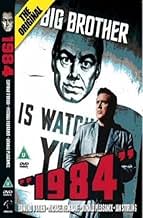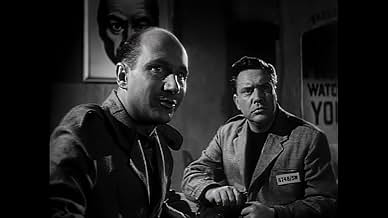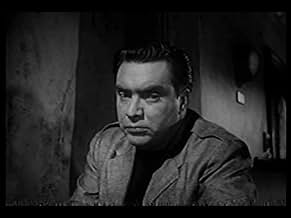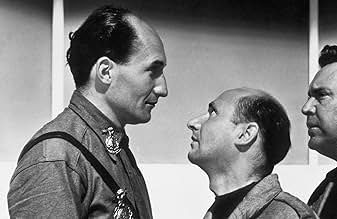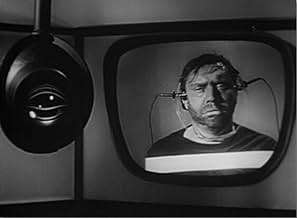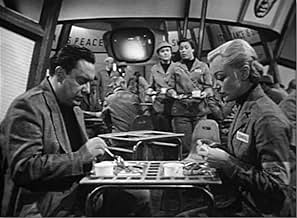IMDb-BEWERTUNG
6,9/10
4612
IHRE BEWERTUNG
George Orwells Roman von einer totalitären Gesellschaft der Zukunft, in der ein Mann, dessen tägliche Arbeit darin besteht, die Geschichte neu zu schreiben, sich aufzulehnen versucht, indem ... Alles lesenGeorge Orwells Roman von einer totalitären Gesellschaft der Zukunft, in der ein Mann, dessen tägliche Arbeit darin besteht, die Geschichte neu zu schreiben, sich aufzulehnen versucht, indem er sich verliebt.George Orwells Roman von einer totalitären Gesellschaft der Zukunft, in der ein Mann, dessen tägliche Arbeit darin besteht, die Geschichte neu zu schreiben, sich aufzulehnen versucht, indem er sich verliebt.
- Regie
- Drehbuch
- Hauptbesetzung
Donald Pleasence
- R. Parsons
- (as Donald Pleasance)
Kenneth Griffith
- Prisoner
- (as Kenneth Griffiths)
Barbara Cavan
- Woman
- (Synchronisation)
- (Nicht genannt)
Walter Gotell
- Guard
- (Nicht genannt)
Anthony Jacobs
- Telescreen
- (Synchronisation)
- (Nicht genannt)
Barbara Keogh
- Special Woman
- (Nicht genannt)
Bernard Rebel
- Kalador
- (Nicht genannt)
Empfohlene Bewertungen
It's been too long since I read the book, so I'm just concerned with the movie as a movie. And what a downer the 90-minutes is for the generally sunny 1950's. Hard to think of a grimmer storyline or more downbeat ending for that period. I take the film's anomalous presence as a useful Cold War commentary on the Soviet Union, the rivalry then at its peak.
Anyhow, the sets are grim, even the one outdoor scene is drained of any natural beauty, while the photography remains dull gray, as it should be given the dystopian subject matter. Then too, the two leads, O'Brien and Sterling, are not exactly marquee names. However, they are excellent actors, as the storyline requires—you don't want "movie stars" competing with the plot-heavy symbolism. In short, the production, though clearly economical, is pretty uncompromising.
Story-wise we're plunged into the middle of the dystopian society without much explanation of how it got that way or why. Instead, the narrative emphasizes the tools of thought control among Party members, who are subjected to all sorts of thought conditioning techniques, such as the histrionic hate sessions. Just how the non-party people live is not really portrayed. However, love may be forbidden among Party members, but I doubt that it was among the common people, otherwise how would re-population take place.
Besides dwelling on Winston's (O'Brien) efforts at contacting the political underground, the script dwells on the forbidden love affair between Winston and Julia (Sterling). And I had to laugh when Julia sheds her shapeless Party uniform for a flowing white gown right out of the Loretta Young Show of the time. This may be the movie's one concession to 1950's norms. The film does manage a few twists, one of which I didn't see coming. But, if I have one complaint, it's that Redgrave's high Party official lacks subtlety, in pretty much a one-note performance. This can be seen as a defect if you think about his official's changing roles.
Anyway, the film remains a visual oddity for then as well as now. However, its thought- control message, though crudely put, may be more relevant in our digitalized age than it was then. At the same time, this is one of the few subjects that I think needs a bigger budget remake to do it justice. I haven't seen the latest remake from 1984, so I can't comment on its worth. All in all, this version maintains a grimly narrow, but thought-provoking focus.
(In passing—having seen the movie on first release, I seem to remember the "rat cage" sequence as being longer, more detailed with glowing eyes, and much scarier than my DVD version. But then that was well over 50-years ago.)
Anyhow, the sets are grim, even the one outdoor scene is drained of any natural beauty, while the photography remains dull gray, as it should be given the dystopian subject matter. Then too, the two leads, O'Brien and Sterling, are not exactly marquee names. However, they are excellent actors, as the storyline requires—you don't want "movie stars" competing with the plot-heavy symbolism. In short, the production, though clearly economical, is pretty uncompromising.
Story-wise we're plunged into the middle of the dystopian society without much explanation of how it got that way or why. Instead, the narrative emphasizes the tools of thought control among Party members, who are subjected to all sorts of thought conditioning techniques, such as the histrionic hate sessions. Just how the non-party people live is not really portrayed. However, love may be forbidden among Party members, but I doubt that it was among the common people, otherwise how would re-population take place.
Besides dwelling on Winston's (O'Brien) efforts at contacting the political underground, the script dwells on the forbidden love affair between Winston and Julia (Sterling). And I had to laugh when Julia sheds her shapeless Party uniform for a flowing white gown right out of the Loretta Young Show of the time. This may be the movie's one concession to 1950's norms. The film does manage a few twists, one of which I didn't see coming. But, if I have one complaint, it's that Redgrave's high Party official lacks subtlety, in pretty much a one-note performance. This can be seen as a defect if you think about his official's changing roles.
Anyway, the film remains a visual oddity for then as well as now. However, its thought- control message, though crudely put, may be more relevant in our digitalized age than it was then. At the same time, this is one of the few subjects that I think needs a bigger budget remake to do it justice. I haven't seen the latest remake from 1984, so I can't comment on its worth. All in all, this version maintains a grimly narrow, but thought-provoking focus.
(In passing—having seen the movie on first release, I seem to remember the "rat cage" sequence as being longer, more detailed with glowing eyes, and much scarier than my DVD version. But then that was well over 50-years ago.)
......is even better. One might be tempted to call this a remake, and I suppose it is, but it was the first theatrical rendition, enabling audiences to watch Big Brother (watching them) on a bigger screen than was possible via the BBC/Peter Cushing version (1954) of two years earlier. I agree with previous commentator "bux's" observance that, while Edmond O'Brien and Jan Sterling may not have been Orwell's first casting choices for Winston and Julia for the reason stated, the sterling performances generated by the leads and their supporting cast more than compensate. As a huge fan of the late, great Hammer Films luminary Michael Ripper, I was especially pleased to see him helping to take up the rear as an Outer Party Orator, exemplifying the tender loving care with which producer N. Peter Rathvon saw fit to cast even the smaller roles.
10bux
Dingy, atmospheric version of George Orwells tale concerning two citizens of the New World Order involved in illicit, illegal love. Nothing is pretty in this story, and perhaps O'Brian and Sterling are a bit long in the tooth for the characters the author had in mind, however the superb dramatizations overcome any casting mishaps. The story of life in a totalitarian society rings chillingly familiar today. And, in the conclusion, to quote the poet laureate of our times, Todd Rundgren "Winston Smith Takes it on the Jaw Again!"
I saw this movie as a young boy,and at the time I was very naive as to what they meant by "Big Brother" Many people to day, in particular the young, do not know the real meaning to Big Brother. Another name for it is the "New World Order" As in the Bible,you will have a noticeable stamp on your body in order to buy food or what have you. And your whereabouts will be monitored. And for this reason, I've NEVER forgotten this movie. It's a must see film by those that are as naive as I was,when I was a young boy.
I saw the movie once back in 1968 or so and thought it was great. Don't know how I'd view it now but I have never had any desire to see the remake. The fact that the movie is in black and white still leaves a very visual impression of the stark, bare lives people like Winston Smith led. No color in their lives and certainly no color in their thoughts was the order of their day. I think the film captured that along with the idea that their technology available was also unenlightening. It served only one purpose and that was to control. I don't think I would be as impressed if the movie were made today. Our technology is too sophisticated. In the original version, less is more.
Wusstest du schon
- WissenswertesSonia Orwell, widow of George Orwell, objected to the changed ending, and had this movie withdrawn from circulation.
- Zitate
O'Connor of the Inner Party: You will be hollow. We will squeeze you empty and fill you with ourselves, with love of Big Brother.
- Alternative VersionenThere are two endings to this film. The UK version ends with a defiant Winston Smith and Julia being executed by the authorities. The US version is more faithful to Orwell's book and concludes with Winston and Julia being brainwashed into becoming loyal followers of "Big Brother."
- VerbindungenFeatured in Hollywood and the Stars: The Angry Screen (1964)
Top-Auswahl
Melde dich zum Bewerten an und greife auf die Watchlist für personalisierte Empfehlungen zu.
- How long is 1984?Powered by Alexa
Details
- Laufzeit
- 1 Std. 30 Min.(90 min)
- Farbe
Zu dieser Seite beitragen
Bearbeitung vorschlagen oder fehlenden Inhalt hinzufügen

